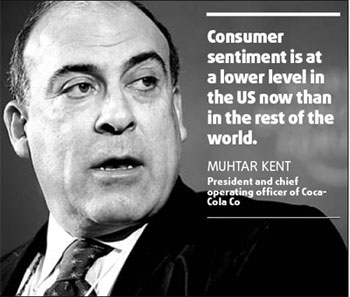Executives warn inflation remains biggest threat
Inflation is now the biggest threat to the global economy as the credit crisis starts to recede, according to executives and officials who met in Russia over the weekend.
"I don't think anyone has found a silver bullet to deal with inflation," Ernst & Young LLP Chief Executive Officer James Turley said.
"Consumers are losing confidence. The liquidity crisis and the credit crisis will work themselves through."
Turley was among 2,300 businesspeople and politicians who gathered in Russia's former imperial capital a day after crude oil prices staged their biggest increase ever.

The surge reinforced concern that central banks will need to either raise interest rates or forgo further cuts, even as growth slows.
"If something should wake us up at night, it's the return of this inflationary environment around the world," Caio Koch-Weser, Deutsche Bank AG vice chairman and former German deputy finance minister, told the St. Petersburg International Economic Forum, Russia's largest trade and investment fair, on Saturday.
European Central Bank President Jean-Claude Trichet said that the bank may raise rates as soon as next month. Two days earlier, Federal Reserve Chairman Ben S. Bernanke indicated he's finished cutting for now.
'Very dangerous'
"We are facing a very dangerous situation caused by these tremendously increasing prices for commodities, food and oil," German Finance Minister Peer Steinbrueck told the gathering.
Inflation in the 15 nations using the euro accelerated to 3.6 percent in May, matching a 16-year high reached in March.
The International Monetary Fund already estimates inflation to be running at its fastest since 1995 in advanced economies.
UN Secretary-General Ban Ki-moon said last week that the world needs to invest as much as $20 billion a year on agriculture to tackle a 60 percent gain in food prices over the past 18 months that has sparked riots in more than 30 countries.
Even with a coordinated effort, prices aren't going to fall any time soon, the IMF said.
"It's pretty clear that we're not going to see a complete reversal of these prices," First Deputy Managing Director John Lipsky said.
"The challenge is to make sure that doesn't turn into ongoing inflation, or a deterioration in inflation expectations."
As the world's biggest economies slow, many companies are looking for sales growth in emerging markets, in particular Brazil, Russia, India and China, known as the BRICs.
Continued economic expansion here will see the nations closing the gap with the US and Europe, Lipsky said.
By the second half, "all the major industrial economies will be growing at a below-trend pace", Lipsky predicted. By contrast, growth in emerging market economies "will still be above their 10 or 15-year averages", Lipsky added.
Goldman Sachs Group Inc. Chief Economist Jim O'Neill, who coined the term BRIC in 2001, forecast China will be the world's second-largest economy by 2020, worth 15 percent of global gross domestic product, against 20 percent for the US.
Prolonged growth in BRIC countries and their increased integration with the world economy will help mitigate the damage from the current global downturn, said Muhtar Kent, president and chief operating officer of Coca-Cola Co, the world's largest soft-drink maker.
"With very disciplined economies in the emerging world, compared to four or five years ago - no deficit, lower inflation, fiscal discipline that is in place today, and the general global macroeconomic scene, there is a higher likelihood that we can pass through this with less pain," Kent said. He will become chief executive of the company on July 1.
WPP Group Plc, the world's second-biggest advertising company, posted 35 percent growth in Russia last year, making it the company's fastest-expanding market, Chief Executive Officer Martin Sorrell said.
US 'paramount'
Even so, the influence of the US economy will remain paramount, he said.
"Everything in the end still points to America," Sorrell said.
"If America falters, if America sneezes, we'll catch not influenza, but a cold, and it will have an impact even in a place like Russia."
Coca-Cola's Kent said consumer sentiment, dented by rising prices, is the main factor affecting global economic growth.
"Consumer sentiment is at a lower level in the US now than in the rest of the world," he said.
"We don't know yet the impact on purchasing power, on demand, in the rest of the world due to the rising price of oil and rising price of food."
Agencies
(China Daily 06/10/2008 page16)














